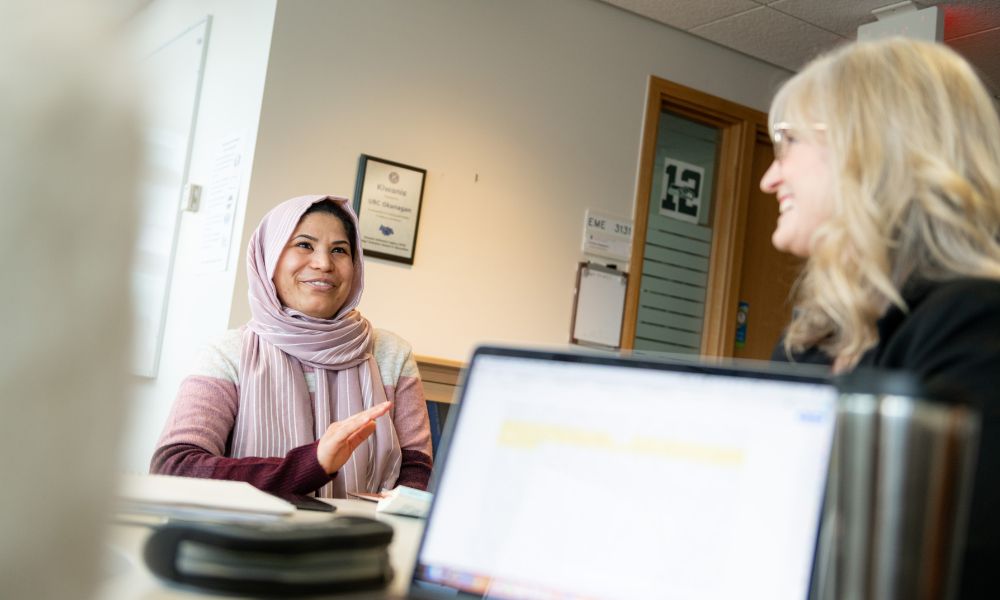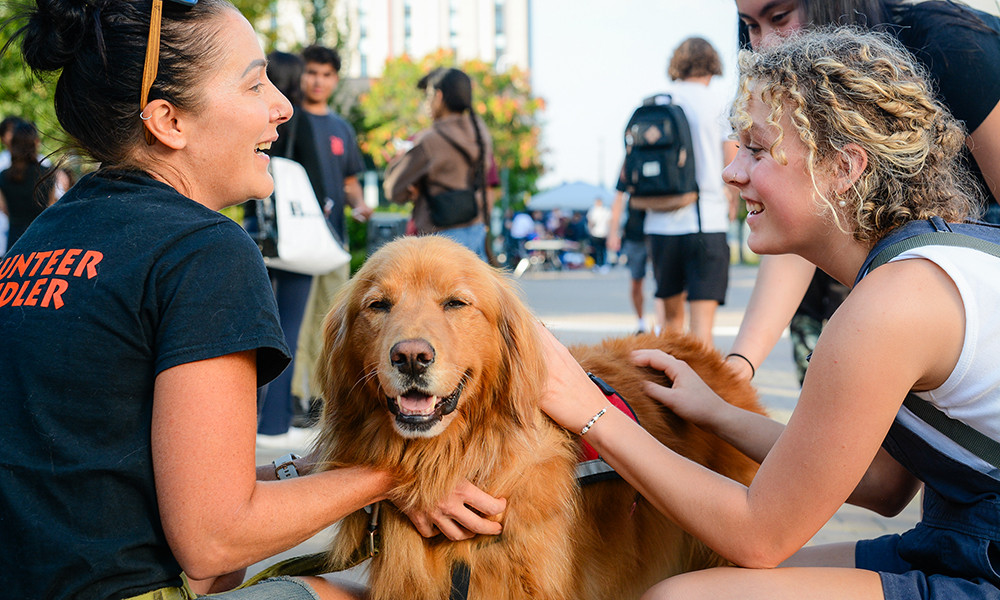Master of Education (MEd), Master of Arts in Education (MA)

Okanagan School of Education
| Program | Components | Length |
|---|---|---|
| Master of Education (MEd) | Capstone Project | 12 to 36 months |
| Master of Education (MEd) | Coursework only | 12 to 36 months |
| Master of Arts in Education (MA) | Thesis | 20 to 36 months |
Why study Master’s (MEd, MA) at UBC Okanagan?
Our master’s degrees are designed for working professionals seeking to deepen their expertise and advance their careers — with flexible course schedules, including online, weekend, weeknight, and summer classes.
We provide a rich learning environment that integrates educational theories, research methodologies, and knowledge frameworks, with a strong emphasis on practical application within students’ professional contexts. Both degrees are ideal for educators, administrators, and professionals looking to develop their leadership capacities and take on advanced roles in educational settings.
Students engage in a collaborative learning community of scholar-practitioners, gaining valuable insights and networking opportunities. By combining theoretical knowledge with practical application, our master’s degrees prepare graduates to make a lasting impact in their educational environments, expand their professional skills, and further their commitment to lifelong learning.
Students enrolled in the MEd degree with capstone project will develop valuable skills and gain the experience necessary to work in a professional field in an education environment. Capstone projects provide an opportunity for students to deepen their understanding of an area of interest.
This pathway culminates in a capstone project under the mentorship of a faculty supervisor. Students will take research-relevant courses that will assist in the development of their capstone project.
The MEd degree with capstone project requires completion of:
- 9 credits of core courses: Curriculum Issues and Theories (CUST 562), Research Methodology in Education (EDUC 500), and Readings and Discourse in Education (EDUC 521);
- 18 credits from the Okanagan School of Education’s course offerings; and
- 3- credit capstone project (EDUC 598)
MEd students are required to complete the degree within four years. Students in this pathway may be interested in completing a Doctor of Education (EdD) in the future.
Visit the Academic Calendar for detailed MEd Program Requirements.
Our MEd degree with coursework only offers rich opportunities for professional development through 30 credits of coursework. Students will plan their courses, with guidance from their assigned supervisor, to build a program that provides broad knowledge at an advanced level to inform their professional practice.
The MEd degree with coursework only requires completion of:
Effective starting September 2024
- 3 credits of EDUC 502: Teacher as Researcher
- 27 credits from the Okanagan School of Education’s course offerings
Prior to September 2024
- 6 credits of core courses: Curriculum Issues and Theories (CUST 562) and Readings and Discourse in Education (EDUC 521);
- 24 credits from the Okanagan School of Education’s course offerings
Visit the Academic Calendar for detailed MEd Program Requirements.
Students in this pathway may be interested in completing a Doctor of Education (EdD) in the future.
The MA degree is primarily for individuals who wish to develop their expertise as educational researchers in addition to their interest in a thematic area of study.
The degree is designed specifically as a research degree, with students required to carry out and complete an independent research project (master’s thesis).
Students must complete:
- 9 credits of core courses: Curriculum Issues and Theories (CUST 562), Research Methodology in Education (EDUC 500), and Readings and Discourse in Education (EDUC 521);
- 15 credits from the Okanagan School of Education’s course offerings; and
- 6-credit thesis (EDUC 599)
Visit the Academic Calendar for detailed MA in Education Program Requirements.
This degree lays the foundation for the pursuit of a PhD and may appeal to students seeking academic positions and careers.
For upcoming courses, please visit the Course Selection & Registration page.
Research and Supervisors
Supervisors
Prospective Master of Arts in Education (MA) students need to reach out to a potential faculty supervisor before beginning the application process. We invite you to discuss your research interests and career goals with us, and we are happy to share our excitement about what we study and teach.
Master of Education (MEd) applicants may indicate a preference for a supervisor on their application, but it is not a guarantee.
If you have general questions about our graduate program, please contact Lindsay Cox at lindsay.cox@ubc.ca
Graduate student supervisor
Graduate student supervisor
Graduate student supervisor
Graduate student supervisor
Graduate student supervisor
Graduate student supervisor
Graduate student supervisor
Graduate student supervisor
Graduate student supervisor. Focus: EAL Teaching and Learning in Adult and Post-Secondary Contexts.
Graduate student supervisor
Graduate student supervisor
Graduate student supervisor
Facilities and Labs
Careers and Outcomes
Build a broad foundation and great career potential with a UBCO master’s degree. Graduates can consider pursuing a career in a variety of fields like,
- Academic Support Advisor (Learning Strategist)
- Child Life Specialist
- College instructor
- Corporate Trainer or Developer
- Curriculum Developer/Instruction Specialist
- Early Childhood Education Program Leadership
- Educational Consultant
- Education Management
- Educational Materials Writing
- Educational Coordinator/Director at Museum, Art Gallery, etc.
- School Administration (e.g., vice-principal, principal positions)
- Superintendent
Tuition and Funding
Tuition
At the master’s level, students pay tuition based on a minimum number of installments, not the number of courses. You can choose to take one course per term or three courses per term and the assessed tuition owed for that term will be the same. Students pay 3 installments per year (September, January and May).
Full-Time
Students on a full-time fee schedule must pay a minimum of 3 instalments for the program. A continuing fee is charged after instalment 6. Please see the academic calendar for details.
| Program | Schedule | Typical Completion Times | Minimum number of instalments | Typical number of Instalments | Domestic (per instalment)* | International (per instalment)* |
| MEd | Full-time | 12 to 20 months | 3 instalments | 3 to 5 instalments | $2,681.09 | $5,678.12 |
| MA | Full-Time | 20 to 24 months | 3 instalments | 5 to 6 instalments | $2,681.09 | $3,884.28 |
*Program entry year 2025S or 2025W
Part-Time
Students who wish to have greater flexibility in the program may choose the part-time fee schedule so that they have three years (36 months) to complete the program without paying any continuing fees.
Part-time students are required to pay a minimum of 9 installments. A continuing fee is charged after instalment 9. Please see the academic calendar for details.
| Program | Schedule | Completion Times | Instalments | Domestic (per instalment)* | International (per instalment)* |
| MEd | Part-time | 36 months | 9 instalments | $1,611.73 | $2,189.65 |
| MA | Part-Time | 36 months | 9 instalments | $1,611.73 | $2,189.65 |
*Program entry year 2025S or 2025W
For official tuition and fee information, visit the UBC Okanagan Academic Calendar, a comprehensive guide to all programs, courses, services and academic policies at the University of British Columbia.
In case of a discrepancy between this webpage and the UBC Calendar, the UBC Calendar entry will be held to be correct.
Completion Timeline Examples
| Term | 12-Month MEd Timeline (Finish in 1 year) |
16-Month MEd Timeline (Finish in 5 terms) |
20-Month MEd Timeline (Finish in 6 terms) |
24-Month MEd Timeline (Finish in 2 years) |
24-Month MA Timeline (Finish in 2 years) |
|---|---|---|---|---|---|
| Winter Term 1 (Sept–Dec) | 3 courses | 2 courses | 2 courses | 1 course | 2 courses |
| Winter Term 2 (Jan–Apr) | 3 courses | 2 courses | 2 courses | 1 course | 2 courses |
| Summer Term 1 (May–June) | 2 courses | 2 courses | 1 course | 1 course | 2 courses |
| Summer Term 2 (July–Aug) | 2 courses | 2 courses | 1 course | 2 courses | 2 courses |
| Winter Term 1 (Year 2) (Sept–Dec) | — | 2 courses | 2 courses | 1 course | Thesis |
| Winter Term 2 (Year 2) (Jan–Apr) | — | — | 2 courses | 1 course | Thesis |
| Summer Term 1 (Year 2) (May–June) | — | — | — | 1 course | Thesis |
| Summer Term 2 (Year 2) (July–Aug) | — | — | — | 2 courses | Thesis |
| Total Courses | 10 courses | 10 courses | 10 courses | 10 courses | 8 courses + thesis |
These timelines are examples only to demonstrate how students may distribute their coursework.
Expense Calculator
The College of Graduate Studies has created an expense calculator for students to estimate their costs while attending UBC Okanagan.
Funding
Note: Limited funding is available on a highly competitive basis for full-time MA students only.
Graduate students are supported financially through a combination of internal and external funding sources, which might include: Scholarship and Fellowship Awards and Research Assistantships (RA).
It is best to speak with your potential supervisor about funding opportunities that are generally available to education graduate students.
Global and Close-Knit
At UBC Okanagan, you gain all the benefits of attending a globally ranked, top 3% university while studying in a close-knit learning community.

Discover the Okanagan
A diverse natural region with sandy beaches, beautiful lakes, vineyards, orchards and snow-capped mountains, the Okanagan is an inspirational landscape perfect for those seeking leisure or outdoor adventure.
UBC's Okanagan campus borders the dynamic city of Kelowna, a hub of economic development with a population of more than 150,000 people— the fourth fastest-growing population in Canada.


















